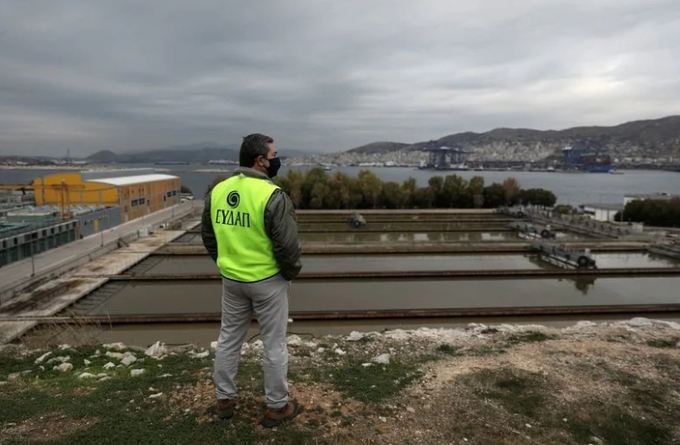November 25, 2025 | 09:04 GMT +7
November 25, 2025 | 09:04 GMT +7
Hotline: 0913.378.918
November 25, 2025 | 09:04 GMT +7
Hotline: 0913.378.918

An employee gathers sewage samples at a wastewater treatment plant on the island of Psyttalia.
Google, H&M, Stripe and other members of the climate-focused Frontier coalition will buy $80 million of carbon credits from a firm using oil industry technology to capture paper mill emissions and another using rocks to do the same at sewage plants.
While U.S. President-elect Donald Trump is expected to withdraw from a deal to cap global warming and cut support for carbon capture, companies in sectors including tech and finance continue to back efforts to remove carbon from the atmosphere.
Unlike efforts to use natural solutions to lock climate-damaging emissions, for example by planting trees, many tech-heavy fixes are still at an early stage and nowhere near sucking up the billions of tons a year needed.
To help bring the cost of the technologies down, Frontier agrees to buy credits from firms with technologies it believes can eventually see the cost drop to $100 a ton or less.
In the latest deals, Frontier said on Tuesday buyers had agreed to pay $48 million, or $214 a metric ton, for credits representing 224,500 metric tons of emissions between 2028 and 2030 from project developer CO280; and $32.1 million, or $447 a ton, for 71,878 tons from New Haven, Connecticut startup CREW.
CO280 is bolting carbon capture and storage (CCS) technology owned by oil field services company SLB onto the smokestack at a paper mill, sucking up carbon initially captured by the trees used to make the paper.
CREW, meanwhile, adds carbon-attracting limestone to water at municipal waste plants, testing CO2 levels going in and out of treatment to calculate how much was captured.
It's a version of a much-discussed process to capitalize on some rocks' natural tendency to capture CO2.
Hannah Bebbington, head of deployment at Frontier, said the two purchases reflected efforts to retrofit older industries with newer carbon technology.
"We are really excited about the possibility for large industrial players to integrate carbon removal technologies and start to deliver carbon removal cheaply and at scale," she said.
(Reuters)

(VAN) An Giang promotes supply-demand connections, standardizes quality and builds value chains, creating a foundation for sustainable bird’s nest development and aiming to expand exports.
/2025/11/24/5339-4-nongnghiep-075331.jpg)
(VAN) Recently, the conference on 'Sustainable Fisheries Linkage Chain - Tilapia for Export' took place in Tien Hai commune, Hung Yen province.
/2025/11/21/4309-2-153400_128.jpg)
(VAN) Green and low-emission rice is paving the way for Vietnamese rice to enter high-end markets, marking the beginning of a transformation journey toward greening and elevating the national rice brand.

(VAN) ‘Right to Win’ outlines a national action plan that shapes a new vision for Viet Nam’s agriculture in an era of renewal and global integration.

(VAN) Lam Dong’s farmed sturgeon output this year is expected to reach 2,300 tons, worth VND 450 billion, affirming the brand’s position on the market.

(VAN) A surge in Ukrainian egg exports, largely driven by soaring sales to the UK over the last few years, has notably pushed up egg prices on the domestic market.

(VAN) The price of Arabica Catimor coffee in Quang Tri is currently at VND 25,000–27,000/kg (fresh cherries), the highest level ever recorded